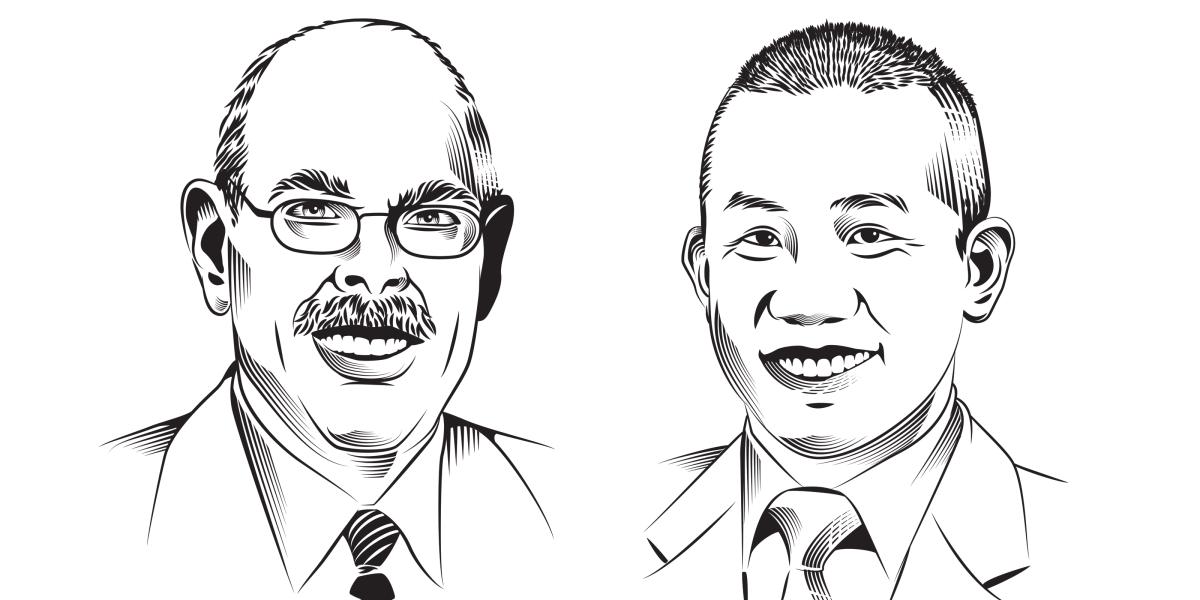The Politics of Health
Former Congressman Henry Waxman and newly elected Maryland state delegate Clarence Lam talk candidly about the Rx for political reform.
President Barack Obama dubbed 20-term Congressman Henry Waxman, JD, “one of the most accomplished legislators of his or any era.” Waxman, now the Centennial Policy Scholar at the Bloomberg School, helped pass laws that expanded Medicaid coverage, reduced smoking and increased access to generic drugs. Clarence Lam, General Preventive Medicine Residency program director and recently elected Maryland state delegate, shares Waxman’s commitment to promoting public health. Lam, MD, MPH ’10, once worked on health oversight investigations for Waxman. He recently reconnected with his former boss to talk about what it takes to rise above partisanship—and profit mongering—to pass seminal legislation.
CL: Is the politicization of science—whether that’s climate change, environmental issues or vaccination policy—a growing trend?
HW: Until five to 10 years ago, most people would pay a lot of deference to scientists because their decisions are based on evidence. Now I see a lot of people in power dismiss science as just another point of view, and probably one that’s biased.
Ideology seems to be much more prevalent in approaching a number of issues that otherwise should be looked at as scientific issues. I remember in the George W. Bush administration, they put statements on the websites of the Department of Health and Human Services that women who have abortions are more likely to have breast cancer. There’s no scientific evidence for that. It just fit in with their idea of being against abortion.
CL: What motivates politicians and special interest groups to discredit scientists today?
HW: There are a lot of groups that oppose what the scientists think we ought to do, for ideological reasons—but more often than not, it’s for profits. I’ve looked at testimony I’ve received over the years, and the arguments [on environmental laws] made in 1982, 1992 and 2009, were exactly the same. “We couldn’t possibly do what this law would require of us. We would go bankrupt. People would lose their jobs. It would hurt the economy.” And yet … they did it at a fraction of the cost that they said it would require. And the economy grew as a result, because as industries had to figure out how to pollute less, they often thought [about] how to be more efficient.
"Until five to 10 years ago, most people would pay a lot of deference to scientists because their decisions are based on evidence. Now I see a lot of people in power dismiss science as just another point of view, and probably one that’s biased."
CL: What’s your advice to scientists, researchers and others reaching out to legislators to effect policy change?
HW: I think it’s important that people who have expertise and knowledge share that with the policymakers. They ought not to feel any reluctance in that kind of a role. They’re the ones who have a special knowledge and whose views carry a lot of weight. So my recommendation is that they try to get those views across.
Because of the nature of what they do, scientists and researchers often don’t want to say things in a conclusive kind of way—because their scientific method is to always keep looking to revise the hypothesis based on new evidence. And so they say, “It appears to be,” or “The overwhelming evidence would indicate…” They need to be honest about how they express it, but not in any way be cowed by the difficulties.
CL: When you first arrived on Capitol Hill, I think there was a greater sense of collegiality and working amongst colleagues, particularly those across the aisle. Do you believe that today’s bickering and grandstanding is the new norm? Or is there hope that the pendulum will once again swing back to that spirit of bipartisanship?
HW: I think the idea of the spirit of bipartisanship is overrated, because we [always] had people who were partisans. But the parties had a more diversity of opinion than each party now has. The Democrats had a strong tradition of [having] very conservative Southerners, and more moderate members, as well as liberals. The Republicans actually had liberal Republican members, who were often more liberal than a lot of the Democrats. But we’ve seen a transition to the two political parties going to polar points on a lot of issues.
CL: So you attribute a lot of what we’re seeing today to further entrenchment within the parties themselves. And that’s led to fewer areas where they could work across the aisle?
HW: The idea of working across the aisle is still there. It’s a question of being patient enough. I look at my career in Congress as a good example. I authored many bills that became law that people now would say, “Well, of course we should be able to get nutritional information when we buy a food item.” Or, “Of course we shouldn’t have to breathe in someone else’s tobacco smoke in a public place.” Or, “It’s obvious that we ought to do everything we can to clean up the air we breathe.”
But there’s no inevitability to anything. Even the simple labeling law took years to pass, to develop the consensus behind it. The Clean Air Act took us 10 years of battling. On a lot of the laws, it sometimes took a decade or more to pass them as we tried to educate people, so that when they heard a quick sound bite from somebody on the other side—who usually had an economic interest in the outcome—to step away and evaluate the evidence and to see what’s really at stake. And eventually, people did come around.
